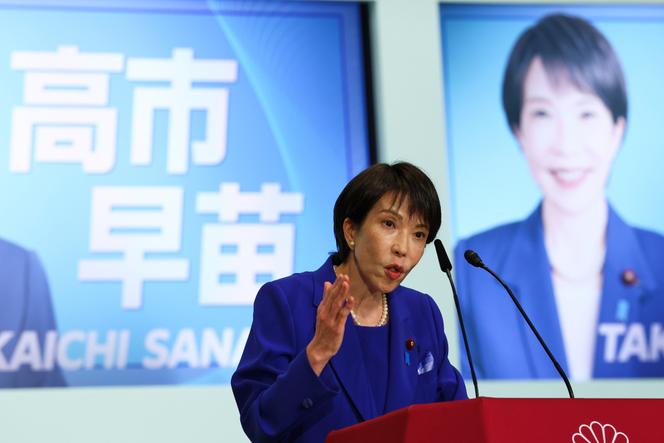
Sanae Takaichi, a radical nationalist, was elected on Saturday October 4, head of the Liberal Democratic Party (PLD), in power. As such, it should soon become the first woman as Prime Minister of Japan.
Mme Takaichi, 64, succeeds Shigeru Ishiba, who had resigned and who had been elected head of government in October 2024 by winning her in the election for the head of the PLD. On Saturday, in the second round of this ballot for which only elected officials and members of the PLD voted, Sanae Takaichi preceded the Minister of Agriculture and very media Shinjiro Koizumi, 44. In Japan, the Prime Minister is traditionally the president of the ruling party, in this case the PLD for decades almost without interruption.
The predecessor of Mme Takaichi, Shigeru Ishiba, had resigned on September 7 after the senatorial elections on July 20, the coalition led by the PLD had lost its absolute majority in the two chambers of Parliament, just a few months after being forced to form a minority government due to its electoral debacle in the lower chamber. This resignation has registered in a paradoxical context since Shigeru Ishiba was in full rise in polls, especially after the trade agreement with the United States.
A firm line on immigration and conservative on societal issues
The new leader of the PLD, and probable future Prime Minister, has rather positioned itself as a last line, focused on national defense and economic security, recently declaring that it would not hesitate to request the renegotiation of customs duties with the United States if certain parts of the agreement were “Unjust or harmful” For Japan.
Mme Takaichi has also adopted firm positions on immigration and foreign tourists, two subjects that appeared as key issues in the race for the Democratic party (PLD, nationalist right). Its ascent coincides with the disenchantment of voters for the PLD, in particular for the benefit of the Sanseeito, a new nationalist party which has expanded its support thanks to anti-immigration messages.
Mme Takaichi is also known to regularly visit the controversial sanctuary of Yasukuni, which honors condemned war criminals, alongside 2.5 million war victims and is perceived by other Asian nations as a symbol of the militarist past of Japan.
The opinions of Mme Takaichi on societal issues place her on the right of an already conservative PLD. It thus opposes the revision of a 19th century lawe A century that requires married couples that they share the same family name, generally that of man. However, in his campaign speech, Mme Takaichi has promised to improve the representation of women within his office, to reach levels “Comparable to those of Scandinavian countries”.
Women are rare in Japanese policy and the boards of directors of Japanese companies: the archipelago ranks 118e out of 146 in the 2025 report of the World Economic Forum on Gender Equality.